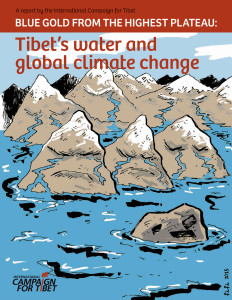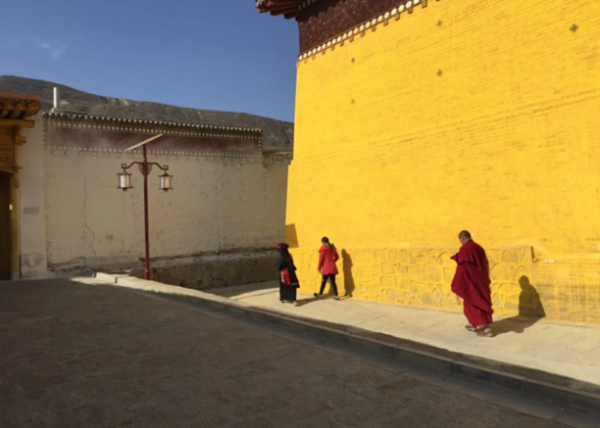New ICT report reveals global significance of Tibet, earth’s Third Pole, and challenges China’s policies
 As the world’s leaders met in Paris earlier this month for critical climate change talks, new findings by the International Campaign for Tibet revealed that Tibet’s fragile environment, which is warming faster than anywhere else, is of critical global importance. But almost unnoticed by the rest of the world, China’s policies are re-shaping the landscape of the earth’s highest and largest plateau with devastating consequences. Read the report here.
As the world’s leaders met in Paris earlier this month for critical climate change talks, new findings by the International Campaign for Tibet revealed that Tibet’s fragile environment, which is warming faster than anywhere else, is of critical global importance. But almost unnoticed by the rest of the world, China’s policies are re-shaping the landscape of the earth’s highest and largest plateau with devastating consequences. Read the report here.
“Tibet is the canary in the coalmine,” Richard Gere says in Al-Jazeera op-ed
On Human Rights Day, and on the anniversary of the Dalai Lama’s visit to Oslo to receive the Nobel Peace Prize, Richard Gere, ICT Chairman of the Board, wrote about how Tibet is warming nearly three times faster than the rest of the world:
One of the most alarming findings by international scientists — among them, many Chinese — is that the Dalai Lama’s home, Tibet, now under Chinese control, is warming nearly three times as fast as the rest of the earth. This matters to all of us. The size of Western Europe and the world’s highest and largest plateau, Tibet, the roof of the world, is also known as the earth’s third pole because it contains the biggest reserves of freshwater outside the Arctic and Antarctic. Its changing climate affects not only the monsoon in Asia but also weather patterns in Europe and across the rest of the Northern Hemisphere. Tibet may be the canary in the coal mine.
As the source of most of Asia’s major rivers, including the Yangtze, the Mekong and the Brahmaputra, Tibet’s fragile ecology is of critical importance to hundreds of millions of people in the water-dependent societies downstream. And yet, relatively unnoticed by the rest of the world, the Chinese government has built and is building dams on all the major rivers running off the Tibetan plateau — one of the most seismically active and unstable areas of the world — with potentially devastating consequences.
His op-ed has since been translated and published in French and Dutch.
“The Radio Operator” released as a Kindle Single Robert Ford received ICT’s Light of Truth Award in 2013
 Robert Ford, an English radio operator working for the Tibetan government at the time of the Chinese invasion, was captured and held for years. Now you can read his story in The Radio Operator, a quick read by James McGrath Morris. Ford went on to be a lifelong friend of Tibet and a recipient of ICT’s Light of Truth award. The e-book is free for Kindle Unlimited subscribers, and $2.99 for everyone else- click here for details.
Robert Ford, an English radio operator working for the Tibetan government at the time of the Chinese invasion, was captured and held for years. Now you can read his story in The Radio Operator, a quick read by James McGrath Morris. Ford went on to be a lifelong friend of Tibet and a recipient of ICT’s Light of Truth award. The e-book is free for Kindle Unlimited subscribers, and $2.99 for everyone else- click here for details.
U.N. Committee against Torture calls China to account for ‘deeply entrenched’ torture and ill-treatment
The U.N. Committee against Torture has condemned China’s record of maltreatment in an unusually long and detailed report that raises serious questions about the way the Chinese Party state operates.
The Committee published its Concluding Observations today following an examination of China’s record on torture in November at the U.N. in Geneva.
Kai Mueller, Executive Director of ICT Germany, said: “The 16 page document signals the Committee’s profound concern about abuses in the PRC, and its commitment to hold the Chinese authorities to account for the suffering endured by those who bore witness to the Committee. It also reflects alarm at China’s attempts to subvert criticism of its record on human rights and to distort the reality – for instance when PRC officials told the Committee that ‘tiger chairs’ used for immobilization and torture are made ‘comfortable’ for the victims, using soft cushions.”
The U.N. Committee did not only criticize the practice of torture and ill-treatment in China, but also tackled the entire PRC system, referring in particular to the lack of independence of the Chinese judiciary and the influence of the CCP as a fundamental failing. It said that it remained “seriously concerned over consistent reports indicating that the practice of torture and ill-treatment is still deeply entrenched in the criminal justice system“, and criticized the lack of independent investigation into torture.
Washington Post on China’s plan to ‘liberate’ a cradle of Tibetan culture

Tibetan monks and laypeople in Rebkong. (Picture by Emily Rauhala)
Here, in a region called Qinghai in Chinese and Amdo in Tibetan, in a town known as Tongren or Rebkong, depending on whom you ask, things exist in disparate pairs: Two portraits. Two languages. A public face and a private heart.
Washington Post reporter Emily Rauhala covers newly-strengthened Chinese repression in Amdo in an important new article, following the implementation of rules ICT translated earlier this year. From her report:
But the Chinese authorities’ new rules, reminiscent of restrictions in the Tibet Autonomous Region to the west, treat these everyday acts of faith as potential crimes against the state: You shall not pray for the Dalai Lama at a religious festival, the notice says. Nor shall you carry his picture in public.
According to the directives, Tibetan calls for “protecting the mother tongue,” “food safety,” “literacy” or “wildlife protection” are merely a “pretext” for separatism, and therefore a threat to “social stability” — a Communist Party buzzword that presages political crackdowns.

